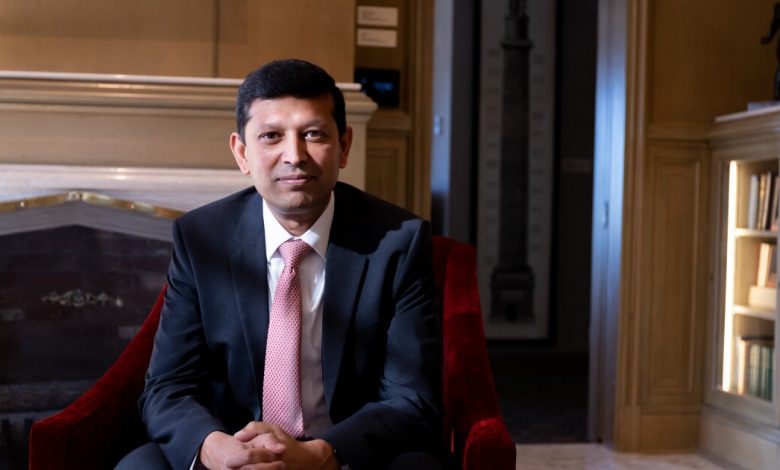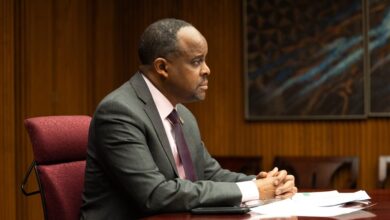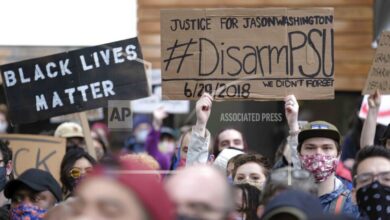Why This Provost Doesn’t Want to Recognize a Grad-Student Union

[ad_1]
As graduate-student instructors have been advocating for union recognition and increased compensation, Indiana University at Bloomington leaders announced this week that they’d waive the students’ mandatory fees and increase their minimum stipends.
And that decision, Indiana’s provost said in a rare interview on Wednesday, is evidence that grad students don’t need a union after all.
Rahul Shrivastav said the university is showing it can respond to students’ concerns and make changes through existing structures, which aligns with recent guidance from Indiana’s Board of Trustees.
The trustees wrote in a letter to the faculty in late May: “The process to enhance the experience for our graduate students is best accomplished through the existing channels of shared governance and collaboration, some new and some that have long driven IU’s progress.”
“To me what this shows is that the mechanisms we have in place work,” Shrivastav said. He continued, “This is the charge that the trustees gave to the president and to me: Fix the problems, but fix them within the structures that exist, and that’s what I’ve done.
But graduate students and university leaders still don’t seem to be on the same page. Members of the Indiana Graduate Workers Coalition have attributed the promised increase in compensation to their activism, but university officials say that’s not the case.
Grad-student instructors at Indiana, known as student academic appointees, went on strike for a month this past spring. While they suspended their strike at the end of the semester, the students said they plann to resume their protest in the fall until officials recognize the coalition as a union.
The Bloomington Faculty Council voted in May to endorse the grad students’ unionization efforts and called on the Board of Trustees take action. But in June, the board rejected those calls. That effectively led to a stalemate in the standoff between grad students and university leaders, with faculty members caught in the middle.
When urged to recognize the union, Indiana’s administration and board have pointed to the university’s task force on graduate education as one of the “existing channels” that Indiana has in place to address such conflicts.
The task force, which consists of a small group of faculty members and one graduate-student representative, recommended last week that the university should cover the cost of mandatory fees for grad students and increase their stipends, among other recommendations. The group did not address whether the university should recognize the coalition as a union and grant collective-bargaining rights to its members.
On Tuesday, IU’s president, Pamela Whitten, and Shrivastav announced that they would carry out two of the task force’s recommendations immediately: increasing to $22,000 the minimum stipend for grad-student instructors (stipends currently start as low as $15,000), and covering their mandatory student fees of $1,435.
Shrivastav said that he made roughly the same amount of money when he was a doctoral student as grad students earn today, and that he knew when he arrived at Indiana as provost in February that a pay increase was needed.
“I think it’s the right thing to do for the students, it’s the right thing to do for the institution, and I’m glad we are able to make progress on it,” he said.
When grad students went on strike in the spring semester, university officials told faculty members to punish strikers who don’t “fulfill their assigned duties” — in other words, teach their classes. Similarly, the board wrote in a May letter to the Faculty Council that faculty members were responsible for ensuring that there was “no disruption to the undergraduate experience.” Anyone “who fails to uphold their responsibilities in this regard,” the board wrote, “will be subject to the consequences stated in these policies.”
Shrivastav said he hopes the grad students don’t resume their strike in the fall, but if they do, the university will enforce those policies.
“Nothing in the policies have changed, and I hope they don’t strike,” he said.
Evan Arnet, a member of the Indiana Graduate Workers Coalition, said the group will hold a vote on September 26 to confirm plans to resume the strike this fall. He said union recognition remains a priority.
“We still see that union recognition is a really critical way to hold the university accountable and make sure that these kinds of things aren’t one-time things, but are part of a commitment to Indiana University to take seriously the well-being of its students and its employees and make sure that this kind of action and these kinds of raises are a priority,” he said.
[ad_2]
Source link






